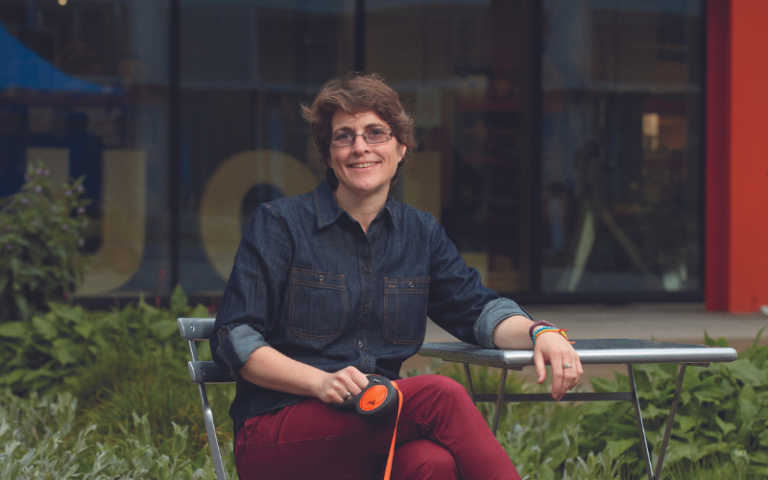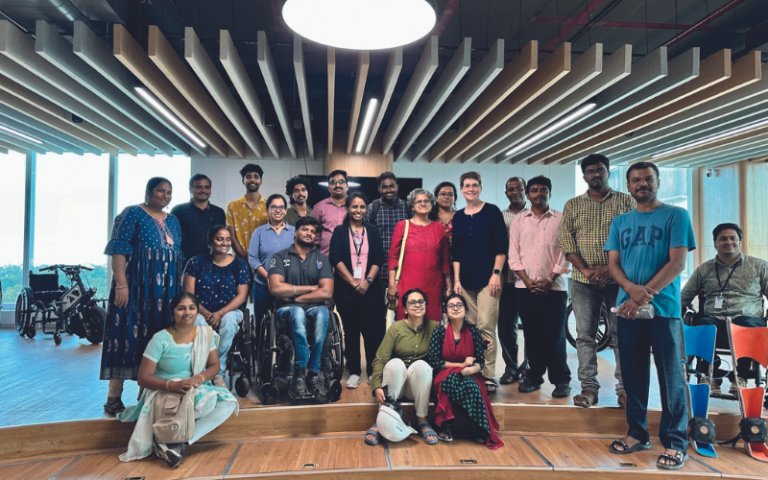Academic spotlight: Professor Cathy Holloway
Professor Cathy Holloway, co-founder and Academic Director of the Global Disability Innovation (GDI) Hub, shares insights into her partnerships in India.

20 November 2023
Professor Cathy Holloway is the co-founder and Academic Director of the Global Disability Innovation (GDI) Hub, a UCL based academic research and practice centre accelerating disability innovation for a fairer world. We spoke to Cathy about her collaborations in India…
Can you give us a brief overview of your research in India?
Our main research projects in India sit under two areas: mobile as assistive technology and assistive technology innovation ecosystem development. This builds on prior research partnerships with IIT Delhi to develop novel assistive technologies for wheelchair users and those with visual impairments. As with all good research, we have developed good friendships and multiple levels of collaboration with our partners.

What got you interested in the subject in the first place?
Assistive technology more broadly – growing up in a nursing home, combined with a love of systems and device design. I am fascinated with the impact on the individual of systems which fail them and how we co-design technologies, projects, and programmes to overcome inequality. As I learnt more about the world and disability, I realised the sad and substantial link between poverty and disability. Our partners in India understand this reality well and have great experience in designing and developing solutions which live up to Mahatma Gandhi’s Talisman.
What difference do you hope it will make?
The main hope is to get more assistive technology to more people who need it, especially those who live in poverty, or at lower socio-economic levels across South-East Asia.
Can you tell us about the GDI Hub’s relationship with India, and the WHO?
GDI Hub is the only WHO collaborating Centre on Assistive Technology. Through this work, we have supported over 150 academic papers, which then supported the first Global Report on Assistive Technology, published by WHO and UNICEF.
The work with WHO is a little separate from the work in India currently, though we coordinate with the regional office as needed. In India, our main work is on the innovation ecosystem presently, and on proving the case for mobile as AT.
One of your recent projects - Tacilia - recently won an Engineering award. Can you tell us more about it?
Tacilia started from the applied problem of how to enable children who are blind or have partial sight to be better able to engage with Science Technology Engineering Arts and Maths (STEAM) education. By investigating the problems faced in the classroom the need for a multiline, reconfigurable tactile interface was identified as needed to help children read books, explore shapes, design and learn to make sense of graphs, charts and other (normally) visual information.
Tacilia is the core work of Tigmanshu Bhatnagar as an output of his PhD and a collaboration between GDI Hub, the Institute of Making and IIT Delhi. Tacilia looks to address a subset of an immense or wicked problem, Quality Education as defined by the UN in Sustainable Development Goal 4 (SDG 4). We developed a process to make hundreds of independently addressable reconfigurable tactile pixels from a single monolithic sheet of Nitinol. This one component replaces nearly 3,000 components of tactile displays and brings down the fabrication cost to only £50 - £150. With Tacilia, people can draw erasable tactile graphics at braille resolution to support learning 2D math, science, and art concepts at their own pace. Tacilia can also convert bespoke digital graphics into tactile graphics in minutes.
Tacilia recently won Innovation of the Year 2023 at the Engineering Talent Awards.
What can UCL learn from your time working in India? What can the UK learn?
We were lucky to secure a small grant from UCL Global Engagement to codevelop elements of Tacilia. These small grants are gold dust in my opinion. It’s very important I think when developing a partnership to have some face-to-face time. So travelling to India to work on something together is essential. Once established, it is easier to work remotely, but relationships take trust, and this takes time.
I am biased in the next opinion, but I believe a UK-India axis on assistive technology, and health and education technologies more broadly could become a powerhouse of innovation. This idea needs nurturing with funding mechanisms that allow for joint research projects, exchange programmes and targeted joint investment in infrastructure.
What would you like to say to other academics at UCL thinking of collaborating with others in India?
The key thing in India is that we are working with equivalent partners in terms of academic endeavour, and yet still there are ways in which we can complement one another to increase impact. In our case, our user-centred design work, which is core to human-computer interaction and disability innovation, complements the core mechanical and electronic engineering abilities within the IITs. GDI Hub is also able to bring a global picture, whereas, of course, our Indian partners have deep knowledge of the local and national ecosystems. This means together we can create exciting research questions, and easily develop a programme of work together. I work in many countries, and India is definitely one of the easier ones in which I have worked in terms of developing and enjoying partnerships and projects.
 Close
Close

